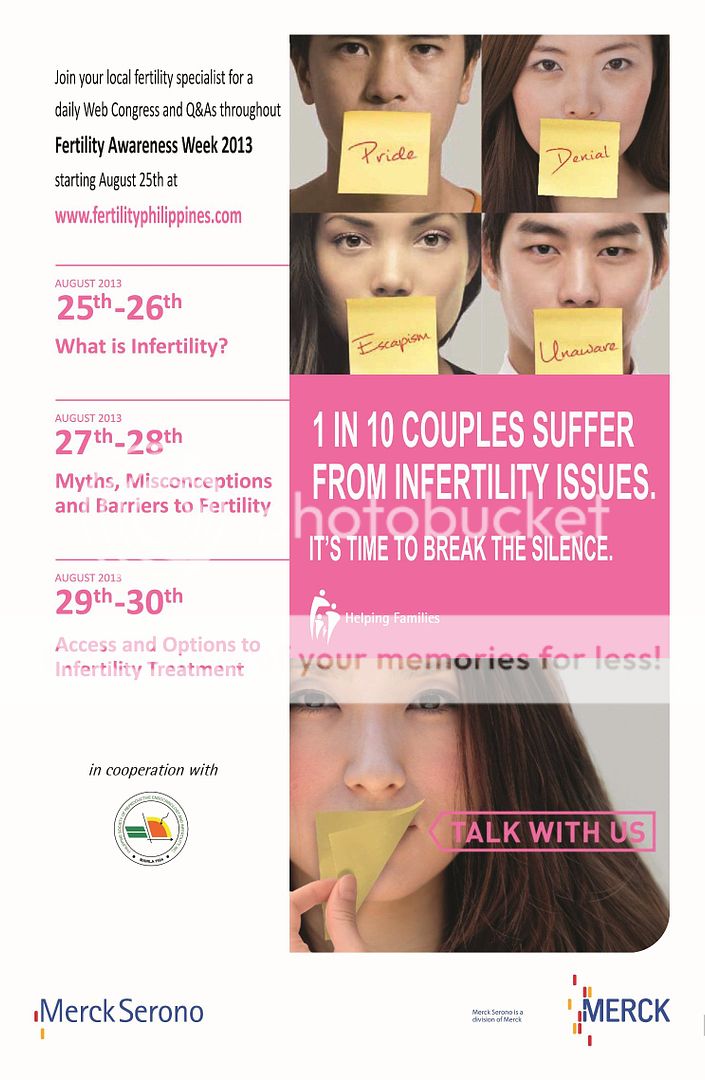Bridging the Fertility Gap
Fertility awareness campaign set to host web sessions on infertility

Manila, Philippines – Forming new life brings unfamiliar excitement and challenge to couples that seek to build a family. However, the decline of fertility rates brings forth a rising concern that couples in Asia are increasingly having difficulty in conceiving. Among the many pressing factors that contribute to infertility are the personal and social issues, and inadequate knowledge about the condition and treatments options.
Aimed at extending knowledge on infertility and its treatments in the Philippines and encouraging couples to seek medical help, the Hope for Starting Families campaign of the local medical community and leading biopharmaceutical company Merck Serono recently led a session that featured expert insights on the common causes of the condition and various methods that couples can take to improve chances of conception.
The Roots of Infertility
During the forum, fertility specialist Dr. Anthony Ancheta, FPOGS (Fellow, Philippine Obstetrical and Gynecological Society), FPSREI (Fellow, Philippine Society of Reproductive Endocrinology and Fertility, Inc.) shared that men and women are faced with a variety of biological and non-biological factors that contribute to infertility. There are male and female characteristics that separately influence the likelihood of conceiving a child as well as undetermined causes that prevent couples from achieving their goal of parenthood.
Female factors that affect infertility, which include ovulation problems, blocked fallopian tubes, uterine factors, and poor egg quality because of age contribute 35-40 percent to the inability of a couple to conceive. Another 35-40 percent account for the male factors that result to infertility include the sperm count, activity and quality, and male tube blockage.
The other 25 percent makes for multiple facets of unexplained fertility. In some cases, men and women undergo necessary tests to determine the cause of their inability to bear a child but results suggest that male and female factors are normal. This prompts a closer look at other sources of the problem such as medical illnesses, family history of infertility, previous surgery, sexual dysfunction, lifestyle factors, and work stress.
“There is an urgent need for couples experiencing infertility to seek treatment but they must first understand their condition with the guidance of their specialists. It is important to fully assess and identify the factors that lead to infertility because each treatment depends on the result of the fertility workup or initial medical tests,” said Dr. Ancheta.
Easy as A, B, C
After a thorough evaluation, couples are guided through options that can help them conceive. According to Dr. Ancheta, specialists begin with the least invasive, most cost-effective way of getting a couple pregnant depending on the complexity and factors that affect chances of having a baby.
“Efficient and cost-effective infertility treatments are here in the Philippines. Of course, there are certain pre-requisites that we must initially consider before going through those methods but it is important for couples to know that there are local experts ready to help and guide them through the process,” Dr. Ancheta explains.
Dr. Ancheta further expressed that assessing infertility treatment options is a rigorous step-by-step procedure that includes a review of the number of years that the couple has been trying to conceive, types of investigations done in the past, and treatment options previously performed. This helps experts in providing patients with a recommendation on how to proceed from one plan to another.
“At an age where people are capable of accessing free information with a click on a button, there is still a low level of understanding of the causes of infertility. Couples who are suffering from this condition acquire information directly from their fertility specialists only upon consultation and some from their peers. There is a need for a more accessible channel to develop their knowledge about infertility in the local and global context and eventually increase their chances of completing their family,” said Dess Cartaño, Fertility Franchise Associate Product Manager at Merck Serono.
In line with its Hope for Starting Families campaign, Merck Serono and the medical community joined hands to provide the online platform www.fertilityphilippines.com. The website aims to serve as a vehicle for information on infertility, its causes, and treatment options for Filipino couples.
From August 25 to 31, the platform will host a microsite for the region wide effort Fertility Awareness Week 2013. The weeklong event will feature a series of web congresses on the nature of infertility, barriers to understanding the condition, and treatment options available in the Philippines for Filipino couples seeking to conceive. With Asia holding one of the lowest fertility rates in the world, each session ultimately aims to address infertility and create a path for couples in the region to openly talk about their difficulties with conceiving. Fertility Awareness Week 2013 is endorsed by the Asia Pacific Initiative on Reproduction (ASPIRE) and the Philippine Society of Reproductive Endocrinology & Infertility (PSREI) in partnership with Merck Serono.
“The misconceptions that are surrounding the condition can only worsen if we do not address the lack of avenues to explain them. There are men and women that recognize infertility as a problem but do not seek treatment because of financial constraints, limited education, and other reasons. With the help of our local fertility experts, the campaign aims to enlighten these couples and provide opportunities to help them experience the joy of bringing forth new life,” added Cartaño.
For more information on Fertility Awareness Week 2013, visit the official Hope for Starting Families website www.fertilityphilippines.com.
-End-
About Merck Serono
Merck Serono is the biopharmaceutical division of Merck KGaA. With headquarters in Darmstadt, Germany, Merck Serono offers leading brands in 150 countries to help patients with cancer, multiple sclerosis, infertility, endocrine and metabolic disorders as well as cardiovascular diseases. In the United States and Canada, EMD Serono operates as a separately incorporated subsidiary of Merck Serono.
Merck Serono discovers, develops, manufactures and markets prescription medicines of both chemical and biological origin in specialist indications. We have an enduring commitment to deliver novel therapies in our core focus areas of neurodegenerative diseases, oncology and rheumatology.
About Merck
Merck is a global pharmaceutical and chemical company with total revenues of €10.3 billion in 2011, a history that began in 1668, and a future shaped by more than 40,000 employees in 67 countries. Its success is characterized by innovations from entrepreneurial employees. Merck’s operating activities come under the umbrella of Merck KGaA, in which the Merck family holds an approximately 70% interest and free shareholders own the remaining approximately 30%. In 1917 the U.S. subsidiary Merck & Co. was expropriated and has been an independent company ever since. For more information, please visit www.merckserono.com or www.merckgroup.com.
For media queries, please contact:
Jinny Jacaria / Thea Geronimo
Strategic Edge, Inc.
Email: group3@seinc.com.ph
DID: +63 892-0247 or 50










